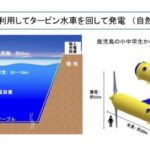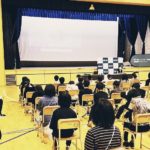“What we learn about and pass on”: The activities of the Chugoku Shimbun Junior Writers
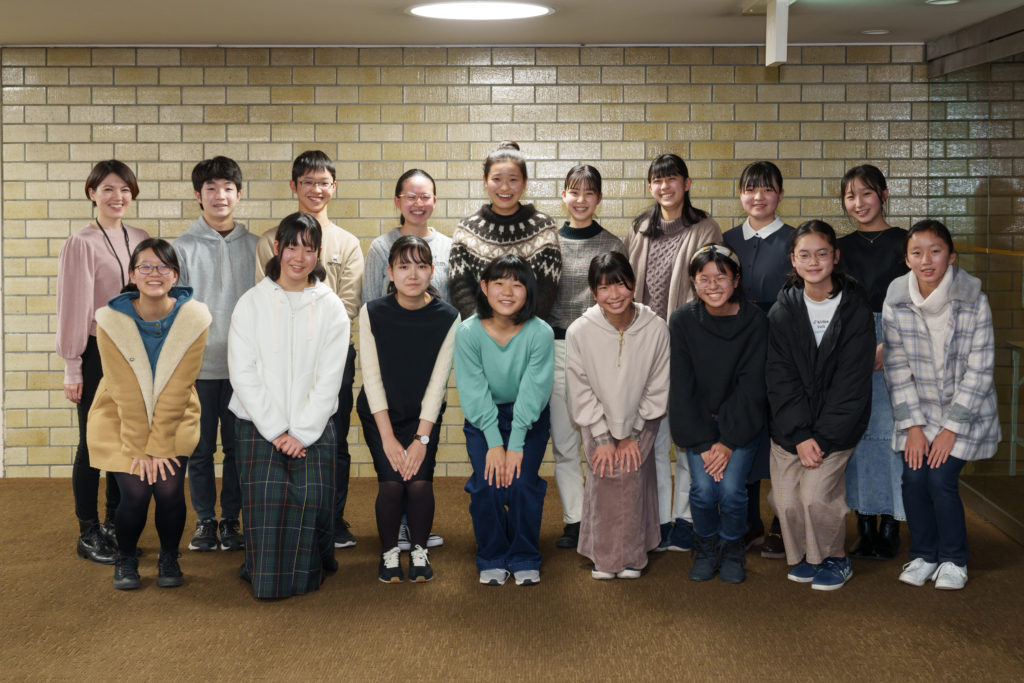
Every year since 2007, the Chugoku Shimbun, a local newspaper in Hiroshima, has invited interested individuals to apply for its “Chugoku Shimbun Junior Writers” program. To date, around 170 participants have completed this program. When the program was first introduced, junior and senior high school students were responsible for planning, conducting interviews, and writing a special feature column once or twice a month called Peace Seeds: Peace Newspaper Produced by Japanese Teens in Hiroshima for the paper. Today, this feature goes by a different name, but its core content has remained the same. The writers are still actively engaged in this initiative. We have spoken to the current batch of Junior Writers at length about their activities and their passion for conducting interviews and writing.
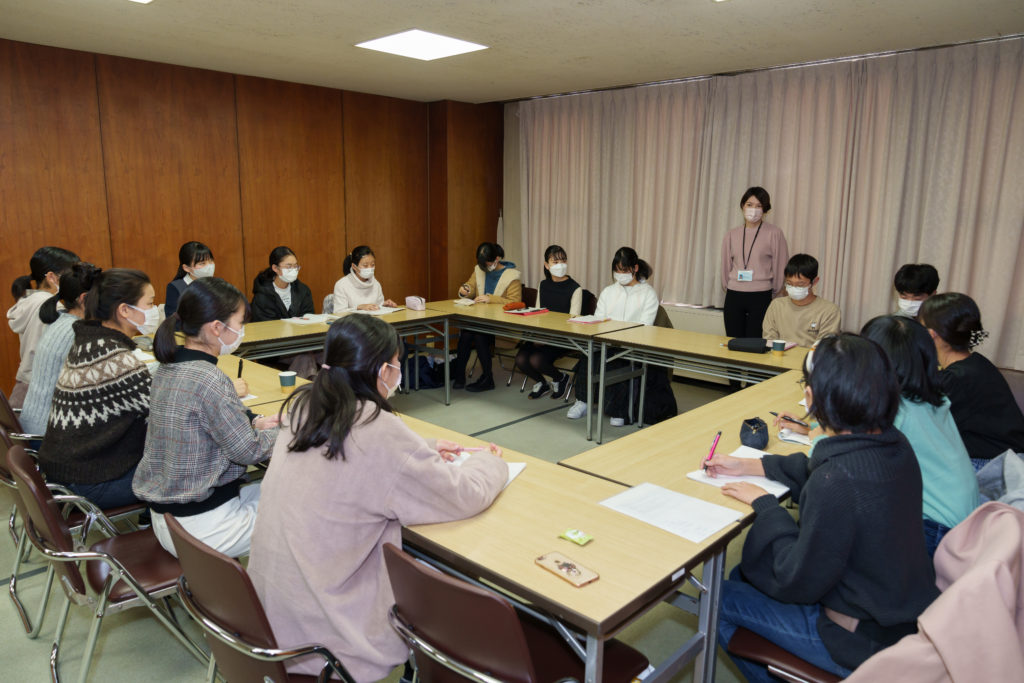
There are currently 23 active Junior Writers, and their articles are published once or twice a month in the Chugoku Shimbun under the title Junior Writers Reporting. The writers consult with adult reporters-in-charge before deciding on a topic they wish to cover (such as damage of the atomic bombing and nuclear weapons, discrimination and poverty, international cooperation, etc.), how to gather opinions on each topic, their interview target, and the perspective of the article. They have also continued to meet A-bomb survivors for face-to-face interviews, which are published once a month in another column called Survivors’ Stories.
“I had attended an elementary school in Hiroshima City, so I’ve had many opportunities to learn about the atomic bombing at school. When I entered junior high school, I wanted to find an outlet that allowed me to spread the word on peace, and that’s when I became a Junior Writer,” said Yamase Chihiro (15 years old), who began her stint as a Junior Writer in the fall of her first year of junior high school.
Nakashima Yuno (15 years old) also recounted her joy of being able to reach more people through her efforts, “Even though we have opportunities to learn about peace and the atomic bombing at school, we have hardly any chance to share them with others, so I’m glad I can have a positive impact on more people through my articles. I’m still embarrassed when my friends see what I’ve written, but I feel that my hard work is worth it whenever my family tells me they have read my articles.”
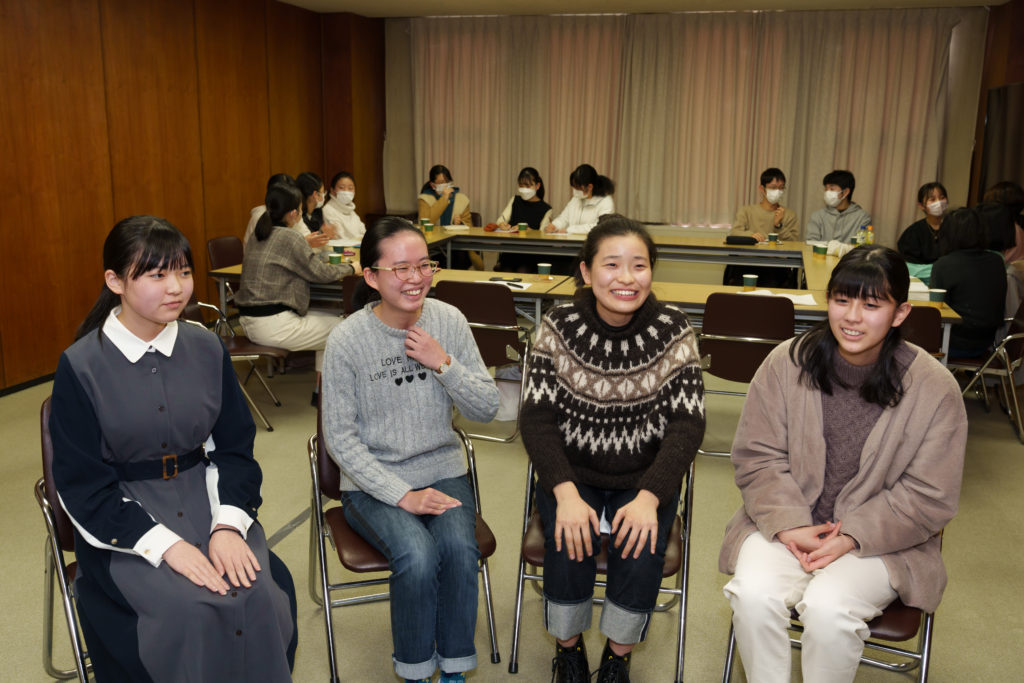
Chugoku Shimbun Junior Writers: Nakashima Yuno, Katsura Hitoha, Okajima Yuna, and Yamase Chihiro ( right to left)
Listening to them makes clear what the Junior Writers get out of their activities is the sense of satisfaction they feel by conducting interviews and writing about the tragic atomic bombing while bearing witness to the feelings of those who had experienced its damage first-hand that they really want to convey, and sharing these feelings with others.
“At first, all I did was to do my best to conduct interviews and write articles. But eventually, I began to think about how I can share the feelings of my interviewees with as many people as possible,” said Okajima Yuna (17 years old). Yamase also told us how her participation in the activities of the Junior Writers has helped her to mature as a person. “A-bomb survivors are very passionate when they talk to us. I think it’s because they feel a sense of urgency to share their stories with others, which has made me think very carefully about how I can convey their passion in my writing. I’ve also gained the ability to organize information on the spot when I’m conducting an interview,” she explained.
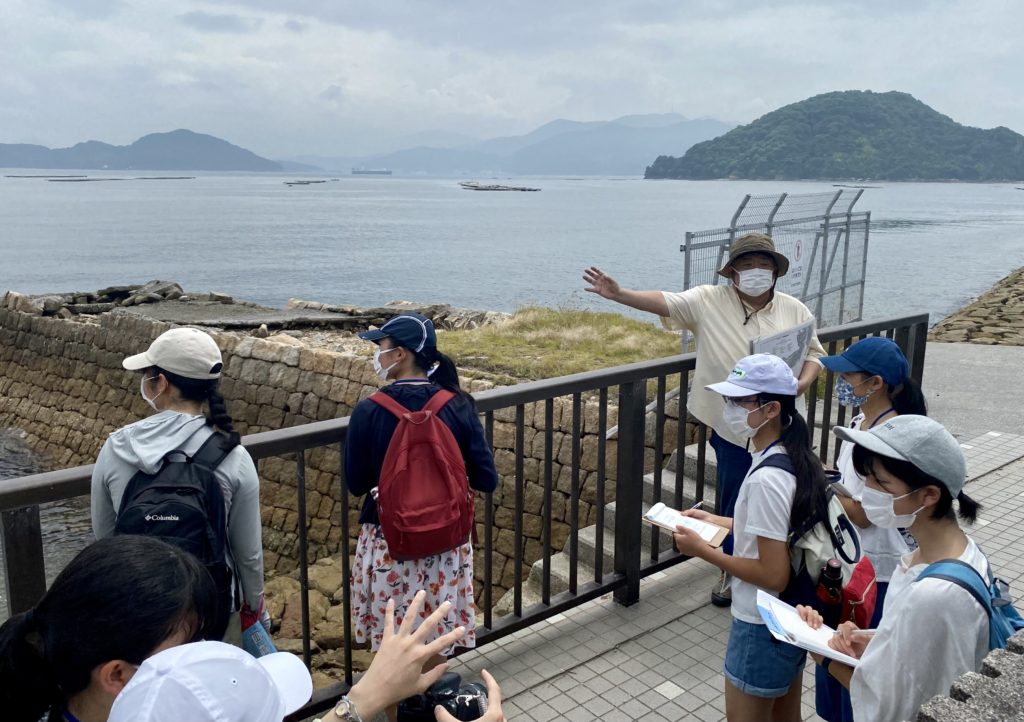
Conducting interviews on Ninoshima, an island off the coast of Hiroshima City to which wounded individuals were transported in quick succession right after the atomic bomb was dropped (2021)
“We weren’t actually there when the bomb was dropped, so we can only imagine what it was like then by listening to the stories of the survivors and through the impression we get. This made me realize the importance of trying to be as empathetic as possible when listening to what they are telling me. What would I have done if I were in their position? For instance, what would I do if my parents were dying right before my eyes and screaming at me to run away?” said Katsura Hitoha (17 years old), who has been serving as a Junior Writer for around five years, the longest among those who are currently active. She has come to appreciate the importance of conveying not just the emotions that she experiences during interviews but also the feelings of the A-bomb survivors by imagining herself in their position.
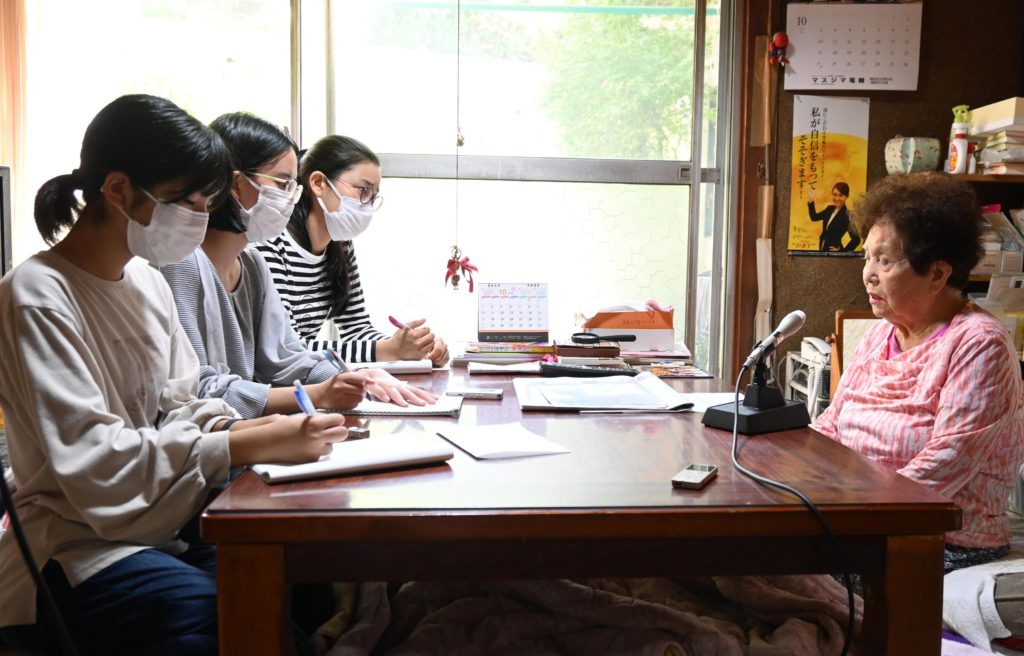
Interview with Sasaguchi Satoko (90 years old at the time of the interview), who was the conductor of the “First Streetcar” that had run through the city just three days after the atomic bomb was dropped (2021)
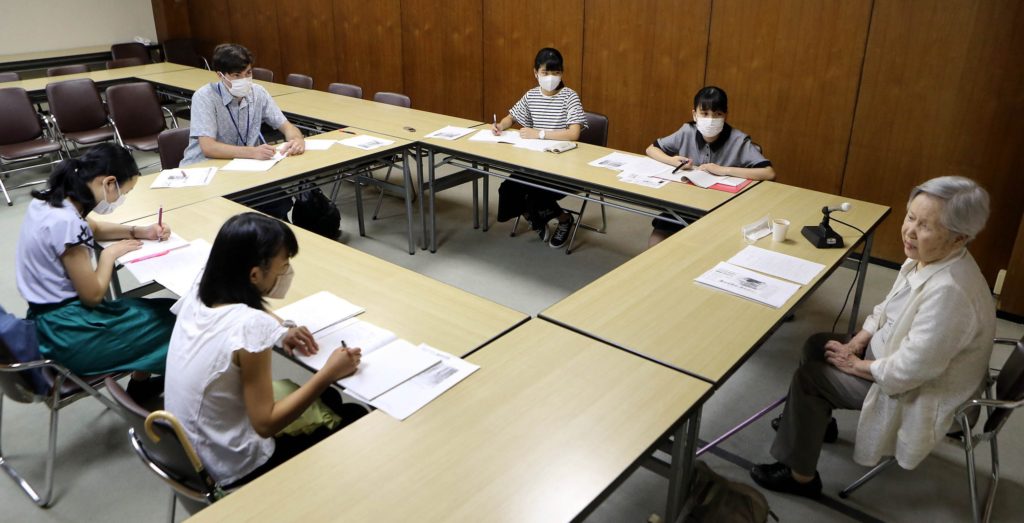
Interview with Teramae Taeko (90 years old at the time of the interview), an A-bomb survivor (2020)
The many interviews conducted and articles written have also had an impact on the behavior of the Junior Writers themselves. In addition to her role as a Junior Writer, Okajima also takes part in an annual lantern floating event held on August 6th as a volunteer. “I think our generation will be the last to hear directly from the A-bomb survivors. That’s why I want to listen to everything they wish to tell us and pass it on. These interviews have allowed me to connect with various people and learn about different kinds of peace efforts. I don’t want to stop at conducting interviews. I now want to actively participate in things that I’m passionate about,” she said.
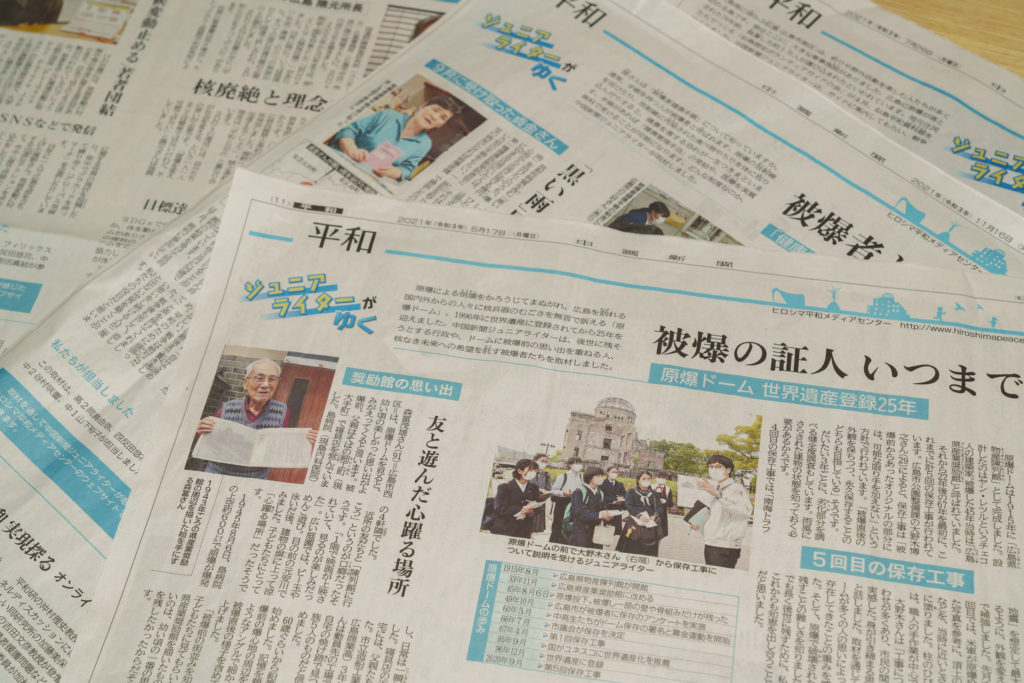
While the Junior Writers have found it impossible to conduct as many interviews as they would have liked because of the COVID-19 pandemic, their enthusiasm for sharing this information and passing it on has not waned.
“When I talk to people from other countries, I realize that sometimes they have different perspectives on the atomic bombing and peace issues. Being able to learn about these differences makes me glad that I’m a Junior Writer. I hope to not only share the views of these people from abroad but also those of the A-bomb survivors as well,” said Yamase, who wishes to share the thoughts of not only the residents of Hiroshima and other parts of Japan, but also those of foreigners who are visiting Hiroshima, with the rest of the world.
Katsura, on the other hand, has her sights firmly set on what she hopes to do in the future after her experience as a Junior Writer. “I’d like tell others about the reality of the atomic bombing that’s still unfamiliar to most people, such as the fact that there are people who are A-bomb survivors even in places like this. I also want to make use of what I’ve learned until now to reflect on various issues, such as why the use of atomic bombs is wrong, how to resolve conflicts, and how to eliminate war. What I can do as someone in my position is something I’d like to always keep in mind even after growing up,” she told us.
The Chugoku Shimbun was able to launch this Junior Writers program and nurture them because of its status as a local newspaper in a city that was targeted by the atomic bombing. The newspaper also hopes to provide opportunities for the Junior Writers to reflect on peace issues from a variety of perspectives through their experience.
Don’t forget to take a look at Junior Writers Reporting, a special feature column in the Chugoku Shimbun that explores Hiroshima’s history of having suffered the atomic bombing through the eyes of children and which chronicles the thoughts of many people.

The Chugoku Shimbun Junior Writers (Hiroshima Peace Media Center)
https://www.hiroshimapeacemedia.jp/?post_type=junior
The Chugoku Shimbun
https://www.chugoku-np.co.jp/
Tags associated with this article



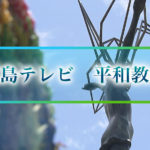
-150x150.jpg)
アンモニア混焼ガスタービン2-150x150.jpg)
